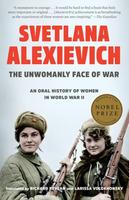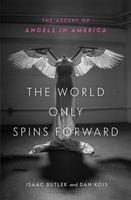As a total history nerd, I've come to relish the challenge of an immense, authoritative tome. As a bookstore employee, however, I'm conscious of how unappetizing a big book filled with dozens of names and dates can look to the average reader. Sweeping histories can sometimes seem dry, even impersonal, with their attention to numbers and generalized trends. I'm reminded of a quote often attributed to Stalin: "A single death is a tragedy; a million deaths is a statistic."
 Done well, oral histories can offer a more intimate perspective. In the field of Soviet history, attention has to be paid to the Nobel Prize-winning work of Svetlana Alexievich, whose oral histories have been praised as "polyphonic writings." Her body of work, including The Unwomanly Face of War (Random House, $18) and Voices from Chernobyl (Dalkey Archive Press, $26), represent, to my mind, the very best of the oral history form, personalizing history in ways that make it approachable and disquietingly intimate. From Voices from Chernobyl: "Sometimes I think it'd be better if you didn't write about us. Then people wouldn't be so afraid. No one talks about cancer in the home of a person who's sick with it. And if someone is in jail with a life sentence, no one mentions that, either."
Done well, oral histories can offer a more intimate perspective. In the field of Soviet history, attention has to be paid to the Nobel Prize-winning work of Svetlana Alexievich, whose oral histories have been praised as "polyphonic writings." Her body of work, including The Unwomanly Face of War (Random House, $18) and Voices from Chernobyl (Dalkey Archive Press, $26), represent, to my mind, the very best of the oral history form, personalizing history in ways that make it approachable and disquietingly intimate. From Voices from Chernobyl: "Sometimes I think it'd be better if you didn't write about us. Then people wouldn't be so afraid. No one talks about cancer in the home of a person who's sick with it. And if someone is in jail with a life sentence, no one mentions that, either."
 The World Only Spins Forward: The Ascent of Angels in America by Isaac Butler and Dan Kois (Bloomsbury, $30) offers new perspectives on the creation and legacy of a dramatic masterpiece. The oral history offers useful insight into the play, but I was especially moved by firsthand accounts of the queer community in the shadow of AIDS. If these histories have anything in common other than the format, it's that they had me constantly underlining passages and/or reading them aloud to a friend. Oral histories call out to be shared and appreciated by as many people as possible. --Hank Stephenson, bookseller, Flyleaf Books, Chapel Hill, N.C.
The World Only Spins Forward: The Ascent of Angels in America by Isaac Butler and Dan Kois (Bloomsbury, $30) offers new perspectives on the creation and legacy of a dramatic masterpiece. The oral history offers useful insight into the play, but I was especially moved by firsthand accounts of the queer community in the shadow of AIDS. If these histories have anything in common other than the format, it's that they had me constantly underlining passages and/or reading them aloud to a friend. Oral histories call out to be shared and appreciated by as many people as possible. --Hank Stephenson, bookseller, Flyleaf Books, Chapel Hill, N.C.

